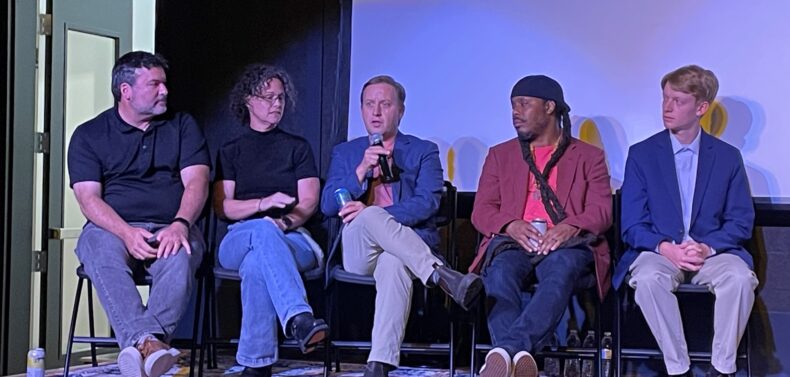Georgia’s 15-year-old tax incentive program for film and TV productions has grown the industry from $135 million in 2007 to more than $4 billion last year. With more than 6 million square feet of studio space, Georgia is now the second-largest production site behind California. But just as that largesse is starting to spread to Athens, state legislators might take it away.
A panel of state lawmakers is currently rethinking the tax credits that spurred that growth. At a June 22 event at downtown music venue The Lewis Room sponsored by Georgia Entertainment News, academics, filmmakers and others in the entertainment industry discussed why the incentive program should be saved and even expanded into other fields, like audio recording, video games and public art.
“You have a $4.4 billion film industry. I want a billion-dollar audio industry,” said Andrew Ratcliffe, who owns The Lewis Room and the Tweed Recording audio production school.
Some legislators are concerned that the state is missing out on $1 billion in tax revenue because of the incentive program, but that assumes productions would still choose Georgia without the 30% tax credit. That hasn’t been the case when states like Louisiana and North Carolina scaled back their incentives, and Texas stands ready to lure any productions that might leave Georgia, speakers said.
“It’s pretty much a known fact that if the tax incentive wasn’t there, they’d go somewhere else,” said Danielle Rusk, a location scout and director of Film Athens.
Part of the problem is that it’s hard to quantify the impact of the creative economy, said David Sutherland, a professor at UGA’s Terry College of Business. In Georgia, it could be anywhere from $24 billion to $48 billion and 134,000–200,000 jobs, depending on how it’s defined. Sutherland advocated for expanding the definition of “creative” to include categories like the visual and culinary arts, developing a strategy and PR campaign to boost the creative economy, and focusing especially on rural Georgia.
So far the film and TV boom has mostly benefited metro Atlanta, where all the major studios are located. Athena Studios, which opened this year in Athens, is the first large studio outside the Atlanta area, and several major productions are set to gear up this August and September, founder Joel Harber said. The studio has a partnership with UGA to train and employ film students.
Georgia State also has a fast-growing film school that’s expanding into video game development. And the Georgia Film Academy, part of the University System of Georgia, has partnerships with more than 25 colleges and universities and 240 high schools in 100 districts all over the state—with the exception of South Georgia, where executive director Scott Votaw said he is aiming to expand. “The big payoff is keeping our talent in the state rather than leaving,” said Brennen Dicker, executive director of GSU’s Creative Media Industries Institute.
Several speakers noted that the film and TV industry doesn’t just employ writers, actors and special effects designers—it supports electricians, construction workers, caterers, restaurants, hotels and others as well. The tax credit program also benefits smaller productions that don’t qualify by ensuring access to equipment and experienced crews. “The tax incentive is great for the big guys, but it’s also great for the little guy, the gritty independent,” said local producer Chris Hines.
Like what you just read? Support Flagpole by making a donation today. Every dollar you give helps fund our ongoing mission to provide Athens with quality, independent journalism.










